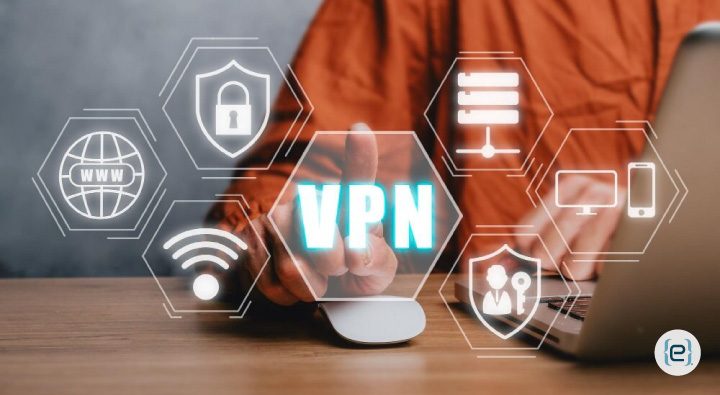The modern connected world makes remote access to corporate networks an essential business requirement, as the switch to working from home means ensuring employees have access to a strong and secure Virtual Private Network (VPN) solution. This is where SSL VPNs have so much to offer: a secure, flexible, and user-friendly remote access solution that gives employees an option of connecting to the organizational network on demand, from anywhere at any time, without compromising security.
What is an SSL VPN?
SSL VPN, which stands for Secure Sockets Layer Virtual Private Network, is a relatively new type of VPN. SSL/TLS (Transport Security Layer) security supports the underlying SSL-based protocol, which takes advantage of another complex standard called X.509 certificate. This technology is the same as a website that secures in-transit data over a channel called SSL/TLS.
In comparison to a traditional VPN, which generally requires the installation of dedicated software and complex configurations, SSL-VPNS uses standard web browsers to make a secure connection. This makes them highly scalable and easy to use for non-technical users. The predominant standoff types are: Clientless, SSL, VPN, Standoff.
How Does SSL VPN Work?
SSL VPNs create an encrypted tunnel for the user’s device to traverse on their way into the corporate network.
- Initiation By User: A remote user opens a web browser (or dedicated SSL VPN Client) and tries to connect through the company network.
- Authentication: users must authenticate their identity to the SSL VPN server. This can be accomplished with a password, multi-factor authentication (MFA), or digital certificates.
- Creating a secure connection: After successful authentication, the server and client will establish an encrypted session via SSL/TLS, phase 1. This is done to make sure that the data transfer between the user and the client network comes out encrypted and safe.
- Accessing Network Resources: Since the secure tunnel is built-in, users are able to access the internal network resources remotely, as if they were physically on the company’s LAN. These could be file servers, applications, email, and even an entire remote desktop session, depending on the configuration.

Key Features of SSL VPNs
Unlike traditional VPNs, SSL VPNs stand out in several ways that have made it the preferred option for remote access.
List of Features that Differentiate SSL VPNs
-
Clientless VPN / Browser-Based Access
A major benefit of SSL VPNs is their ability to be relatively clientless, not requiring the installation of special VPN software on user devices. Instead, you get to the VPN via a regular web browser such as Chrome, Firefox, or Safari. This is particularly important for situations where administrators are not allowed to install software, or for shared/public-device scenarios.
SSL VPNs provide a minimal access web portal for end users that only need to launch specific web applications, simple file shares, or internal web pages without needing full network access to connect to them.
-
Ability to Create Network Sockets (SSL VPN Client)
If users need full access to the corporate network, for example, to run internal applications or to connect to multiple servers, then an SSL VPN client can be used. A client typically requires remote users to install the client-side software to create an encrypted tunnel from their location on campus over the network, giving them full access off-campus.
This method is useful for cases when staff members must work on complicated tasks, such as remote desktop sessions, secure file transfers, or gaining access to internal databases that require data traffic between their devices and corporate networks to be fully encrypted.
-
Encryption and Security
SSL VPNs use the SSL/TLS protocol to encrypt all traffic between a user and the network, so any data sent from the user to the network will be secure. Nothing will do it faster when trying to work over an unsecured public Wi-Fi network, where your personal or company data might be easily intercepted or extracted directly from a wireless channel.
Different from encryption, SSL VPNs also offer various types of security controls (multi-factor authentication, digital certificates, and tokens among others) that help to impede unauthorized network access.
-
Granular Access Control
Precise Network Access Policy Enforcement: SSL VPNs allow network administrators granular access policies. In this way, they can determine which users should access what applications, files, or network resources based on their role in the company. They can also limit access to specific areas of the network based on the type or location of the user.
An administrator could allow an employee to access internal web applications, but prevent them from having access to sensitive financial databases unless they are connecting to it through a device issued by the company.
-
Platform Agnostic
SSL VPNs — SSL VPN is one type of an endpoint agent that uses the web browser as a medium for clientless access. Since it does not require any software installation, this agent operates on every operating system, like Windows, macOS, Linux, along with mobile devices such as iOS and Android. Therefore, SSL VPNs are very flexible, which is suitable for organizations that use a variety of devices and platforms.
The Relevance of SSL VPNs in Today’s Technology Landscape
SSL VPNs are essential for businesses today, especially with the rise of remote work and BYOD (Bring Your Own Device). Offering a safe and easy-to-use remote access method that doesn’t involve complicated setups, or any sort of special software configurations increases productivity, since employees can work from anywhere, while maintaining security by keeping important corporate data safe.
Third-party contractors or temporary workers who require limited access to certain resources without network-wide entitlement are also perfectly suited to use SSL VPNs due to their flexibility.
With businesses of all shapes and sizes transitioning to a more mobile, remote work reality, the demand for secure yet highly flexible remote access solutions will continue to increase. SSL VPNs offer a great mix of security, user-friendliness, and accessibility, completing the bill for organizations across the board. Deployed with characteristics such as end-to-end encryption, clientless access, and granular access control, SSL VPNs supply a sturdy and flexible option to secure remote connections and safeguard sensitive information. Trained professionals from eMazzanti can help your company with VPN solutions that will protect your digital assets while creating a conducive atmosphere of working from anyplace with full encryption.







